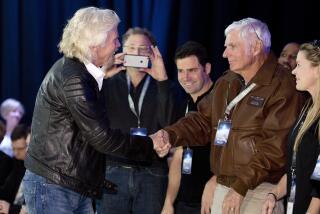M. Lamar Muse, 86; airline industry maverick had a hand in rise of Southwest Airlines
- Share via
M. Lamar Muse, the maverick executive whose innovations at Southwest Airlines Co. in the 1970s helped revolutionize the airline industry, died of lung cancer Monday at a Dallas retirement home. He was 86.
During a turbulent 37-year career that included stints at several carriers -- including his own Muse Air -- Muse forged a reputation as an airline trendsetter who wasn’t afraid to buck conventional wisdom.
Although his role in the rise of Southwest was often reduced to little more than a footnote in the company’s history, many in the industry credit Muse with developing the basic template for the airline’s success: no-frills travel with frequent service at prices anyone could afford.
“He created the model that Southwest still follows today,” said Scott Hamilton, an aviation consultant and former Muse Air executive. “And you have airlines around the world following the Southwest model and that goes back to Lamar.
“He’s one of the industry’s greatest unrecognized giants.”
Along the way, the plain-spoken Texan also became known for a blunt approach to interpersonal relations that could wound as well as charm.
“He could be difficult to get along with,” his son and fellow airline executive Michael Muse acknowledged. “He was very upfront with everybody. He didn’t care whose feelings he hurt. He was always going to express his view of things.”
A sense of humor leavened the sometimes harsh demeanor, his daughter Deborah Ann Muse said, as did his habit of punctuating conversations with chicken-fried expressions such as “that’s how the cow ate the cabbage.”
Marion Lamar Muse -- “He hated to be called Marion,” Deborah Ann Muse recalled -- was born in Houston in 1920 and grew up in the town of Palestine in East Texas. He attended Southwestern University in Georgetown, Texas, on a music scholarship, playing clarinet and saxophone, and then Texas Christian University in Fort Worth.
After serving in the U.S. Army Corps of Engineers during World War II, Muse worked as an accountant before landing his first airline job in 1948 at Trans Texas Airways. He went on to work for American Airlines, Southern Airways and Universal Airlines (among other stops) before joining fledging Southwest as president and chief executive in 1971.
Referring to Muse as “a cantankerous genius,” Southwest co-founder Herb Kelleher told the Dallas Morning News that his former colleague “was the perfect person -- because he was tough, he was competitive, he was hard-minded -- to get Southwest Airlines off the ground and turn it into a moneymaker.”
Southwest’s original operating plan, famously sketched out on the back of a cocktail napkin, consisted of three planes flying between San Antonio, Houston and the airline’s home base at Dallas’ Love Field. Faced with intense competition from entrenched rivals such as Dallas-based Braniff International, Muse developed a strategy based on cheap tickets and attention-getting stunts.
“When Braniff lowered its fares to $13 between Dallas and Houston to try to drive Southwest out of business, Lamar put full-page ads in the papers that said, ‘No one’s going to shoot us out of the air for $13,’ ” Hamilton said. And just to make sure, Muse provided an added enticement of free bottles of whiskey.
Playing off the name of its home airport, Southwest became known under Muse’s guidance as the “love airline,” featuring flight attendants in hot pants and the stock ticker symbol LUV.
But there was little love in the air after Muse left Southwest following a 1978 boardroom battle. Along with Michael Muse, he launched Dallas-based Muse Air in 1980. Referred to by industry wags as “Revenge Air” and known for its groundbreaking onboard smoking ban, Muse’s new airline became locked in a bitter struggle with Southwest.
“It was like Southwest wasn’t going to give those guys an inch,” said John Pincavage, a Westport, Conn., airline consultant, noting that the older carrier would slash fares to “absurd” levels to squeeze Muse Air out of markets.
“All of a sudden,” Pincavage said, “the friendship became enmity.”
Muse had gone into semi-retirement, leaving his son to run the airline. But with Muse Air struggling, he returned to the controls in late 1984 in a move that led to strained relations between father and son.
“We were estranged for a number of years, but that was more my problem than his,” Michael Muse said. He said they eventually reconciled, spending a great deal of time together in the last weeks of his father’s life.
Southwest bought Muse Air in 1985, changing the name to TranStar and moving it to Houston. Faced with mounting losses, Southwest shut the airline down in 1987.
Although Muse never held another airline job, he remained attached to Southwest, which under Kelleher’s leadership grew to be the nation’s No. 3 airline based on miles flown by passengers.
“He was always writing e-mails and exchanging phone calls” with Southwest executives, Michael Muse said. “He wasn’t bashful about giving his opinion on what they were doing right and what they were doing wrong.”
He is survived by three children from his first marriage to Juanice Muse, who died in 1974: Michael Muse, Deborah Ann Muse and Diane Muse Kinnan; a daughter, Lisa Muse, from his marriage to ex-wife Barbara Deese Muse; three grandchildren, one great-grandchild and sister Marian Thompson.
*
More to Read
Inside the business of entertainment
The Wide Shot brings you news, analysis and insights on everything from streaming wars to production — and what it all means for the future.
You may occasionally receive promotional content from the Los Angeles Times.










